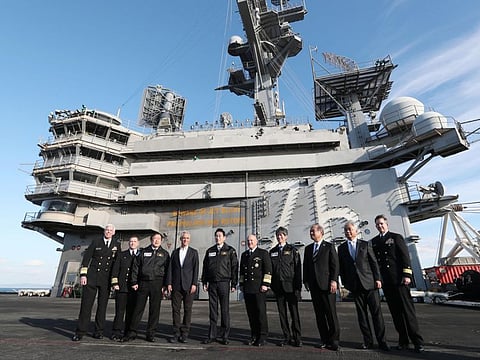Japan PM vows to strengthen military
Eighteen warships from 12 countries join international fleet review

Tokyo: Japan’s Prime Minister Fumio Kishida said at an international fleet review Sunday that his country urgently needs to strengthen its military capabilities as security risks increase including threats from North Korea’s nuclear and missile advancement and Russia’s war on Ukraine.
Eighteen warships from 12 countries participated in the review, including the US, Australia, Canada, India, New Zealand, Singapore and South Korea, while the U.S. and France also sent warplanes.
South Korea joined for the first time in seven years, in the latest sign of improvement in badly strained ties between Tokyo and Seoul over Japan’s wartime atrocities.
“The security environment in the East and South China seas, especially around Japan, is increasingly becoming more severe,” Kishida said, noting North Korea’s increased missile firings, including one that flew over Japan last month, and growing concern about the impact in Asia of the Russian invasion of Ukraine.
Avoiding disputes and seeking dialogue is important, Kishida said, but it is also necessary to be prepared for provocations and threats to peace and stability. He repeated his pledge to significantly reinforce Japan’s military capability within five years.
Focus on warships, missile defence
Kishida said Japan urgently needs to build more warships, strengthen anti-missile capability and improve working conditions for troops.
“We have no time to waste,” Kishida said after his review aboard the JS Izumo, where naval officers from the participating countries gathered to review a demonstration of the frigates, submarines, supply ships and warplanes in Sagami Bay southwest of Tokyo.
The 248 metre long Izumo has been retrofitted so that it can carry F-35Bs, stealth fighters capable of short take-offs and vertical landings, as Japan increasingly works side-by-side with the U.S. military.
Kishida said Japan will further strengthen the deterrence and response capability of the Japan-U.S. alliance.
Later Sunday, Kishida and US Ambassador to Japan Rahm Emanuel visited the USS Ronald Reagan, the U.S. Navy’s only aircraft career based outside the US mainland, off the US naval base of Yokosuka.
Joint exercises
The US military, which had just finished a joint exercise with South Korea that prompted missile barrages and other warnings from North Korea, is set to hold major drills with Japan later this month in southwestern Japan. Australia, Canada and Britain will join part of the drills, while France, India, New Zealand, the Philippines and South Korea are expected to take part as observers.
Japan has steadily stepped up its international defense role and military spending over the past decade, and plans to double its military budget in the next five to 10 years to about 2% of its GDP, citing a NATO standard, amid threats from North Korea and China’s growing assertiveness.
Sign up for the Daily Briefing
Get the latest news and updates straight to your inbox



